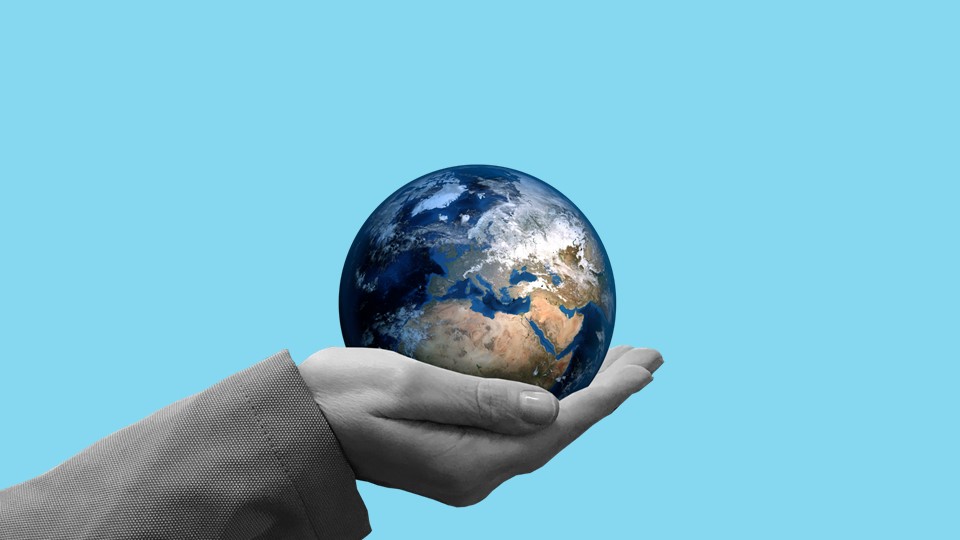The new coronavirus pandemic has been an unprecedented shock to the world, with widespread systemic impacts. The lives and health of people are at the heart of the response.
As the world emerges from the most acute phase, the focus is shifting towards the future and an economic reboot. There is now a narrow window of opportunity to reflect and act on what we want our future economies to look like. We have seen the rapidity and scale of action possible when the whole of society, including governments, businesses and individuals, collectively face and respond to an acute problem.
Across a wide range of countries, governments are rolling out economic support programmes at an unprecedented scale and the channeling of this money will determine and lock in pathways towards a future that either fits within or overshoots our planetary boundaries.
So far, these actions and discussions have been focused on the national level and national interest. However, in a globally connected economy, their success will largely depend on international trade co-operation – and trust.
A window of opportunity to solve multiple problems at once
Rebuilding after the coronavirus crisis presents an opportunity to create something new and better. We have been living far beyond the carrying capacity of the earth and taken inadequate measures to address climate change, loss of biodiversity and overuse of virgin natural resources. Following the supply chain disruptions resulting from the coronavirus, scarcity has suddenly become less abstract a concept in large parts of the world. This presents an opportunity to address some of the failures resulting from the waste and haste inherent in our linear economies.
The circular economy The circular economy An economic model which does not focus on producing more and more goods, but in which consumption is based on using services – sharing, renting and recycling – instead of owning. Materials are not destroyed in the end, but are used to make new products over and over again. Open term page The circular economy provides concrete tools for companies to create value by preventing waste and pollution in the first place through more careful design and new business models focused around sharing and services that let products remain in use longer. Beyond helping us get more from less, the circular economy represents a more resilient economic model – one that directly addresses some of the biggest crises of our time. The way we extract and process natural resources is responsible for 90% of biodiversity loss, while the circular economy represents 45% of the solution for reaching zero CO2 emissions by 2050.
Globalisation is transforming and so will trade in support of a carbon-neutral, circular transition
Global co-operation has never been more important than in this crisis. However, already before the coronavirus pandemic, the global trading system had come under increased pressure through mounting protectionism and trade wars. Negotiations on new rules at the World Trade Organization (WTO) have been at a near standstill and the dispute settlement system has been crippled.
On 14 May, WTO Director-General Roberto Azevêdo announced his early departure from his post, to give way to new leadership that will be required in order to chart a wider reform process for the institution.
New openings in trade are predominantly happening in regional free-trade agreements, FTAs. Global value chains already started becoming shorter during the 2010s, with some researchers identifying 2012 as the year of peak globalization. Globalisation has not, however, reached the end of its road. Rather, it is transforming.
Value creation is increasingly knowledge- and data-intensive, and services trade has continued to grow at a faster pace than goods since 2005. The coronavirus crisis has speeded up these trends as it has exposed the vulnerability of complex value chains and just-in-time production and delivery.
Business strategies and trade patterns are being redrawn. The fourth industrial revolution acts as a major driver. At the same time, it can serve as a powerful enabler of the circular economy transition. The EU places a strong emphasis on digitalisation in its recent Circular Economy Action Plan, and new circular economy business models, such as sharing platforms and product-as-a-service systems, are key elements of the new circular economy. The potential of these solutions cannot be unlocked without international trade.
What about trade policy?
Trade has been hit hard by the pandemic with a deep dive in global trade flows. In addition, many countries have set in place protectionist measures affecting goods intended to remedy the coronavirus, such as medicines, medical devices and personal protective equipment.
However, it is clear that the role of international co-operation and institutions such as a well-functioning WTO will be key to a successful recovery. Through predictability, stability and trust, the rules-based system of the WTO provides the framework companies need to look ahead, plan operations and maintain and create jobs. Many countries have been calling for reform of the WTO to fit current realities. As this reform starts to take shape, our planetary sustainability must be be treated as the foundation.
Just as at the national level in the response to the pandemic, the next step will be to look further into the future and at the potential of the WTO to support a carbon-neutral, circular recovery at the global level. How can the WTO system allow for the creation of synergies between national and regional green recovery plans and support the creation of flourishing international markets that are both greener and more accessible to developing countries?
The following six points provide a starting point for discussion.
1. Continue to strengthen dialogue and information sharing at the WTO
Trade policymakers need to keep up the dialogue at the WTO Committee on Trade and Environment (CTE) on the circular economy and trade, building on the successful, diverse and inclusive discussions of the past year and a half. Dynamic side events and stakeholder engagement have been a key feature of the dialogue. Green recovery should now become part and parcel of the discussions.
Co-operation with other organisations on the circular economy is important. Here, the role of standard-setting bodies like the International Organization for Standardization (ISO) or those responsible for relevant definitions and categorisation such as the World Customs Organization and Basel Convention Secretariat come to fore. The circular economy will entail a new product policy based on full product life cycles, and standards supporting safe, repairable , long-lasting products that can be repurposed to fit back into the economy at the end of their useful life will guide the transition. The global trading system needs to take this into account.
2. Towards a statement on MC12 and WTO reform
Sustainable development and protection and preservation of the environment are fundamental goals of the WTO enshrined in the Marrakesh Agreement. They complement the WTO’s objective to reduce trade barriers and eliminate discriminatory treatment in international trade relations. Already now, the WTO members can adopt trade-related measures aimed at protecting the environment under certain conditions.
The next ministerial conference of the WTO, MC12, was scheduled to be held in Nur-Sultan, Kazakhstan this June. It has, however, been postponed for a year or more. Already, many countries were engaged in developing a ministerial statement on climate, the environment and sustainability. This momentum should not be lost, and the statement could, in order to be more topical in the post-coronavirus era, include additional emphasis on synergies with a carbon-neutral circular recovery and a wider transition. As countries focus their vision on the future of the WTO, sustainability needs to be at its heart.
In his resignation announcement from the WTO on 14 May, Director-General Azevêdo expressed his opinion that MC12 “will be a critical landmark” and “should be a stepping stone to the future of the WTO”. In their COVID-19 recovery statements, a number of WTO members emphasised that the reform of the WTO should contribute to tackling common global challenges with the trade-related tools available.
3. Liberalise trade in environmental goods and services
The longstanding saga on liberalising trade in environmental goods and services is as relevant as ever – or even more so. Could the most active countries behind the Environmental Goods Agreement (EGA) seek support for a restart? As time is ticking and technological development continues apace, key questions to consider would include: Which technologies and services will be rolled out under green recovery packages? What is the impact of data and digitalisation? What could these new global value chains look like and how can they be supported? Has the EGA product list become obsolete in this dynamic environment, and should experts start looking specifically at circular economy solutions?
4. Ensure developing countries are on board
Developing countries have been extremely active in contributing to the discussions and solutions related to the circular economy at the CTE. Now is the time to get down to detail and ensure their specific needs are met under Aid-for-Trade, complemented by Official Development Assistance that supports a recovery that contributes to the low-carbon circular transition. Resilience and social inclusion are at the centre of a just transition. The unique knowledge and solutions in developing countries need to freely flow outwards through regional and global value chains and trade.
5. Get the prices right
New Zealand and the Friends of Fossil Fuel Subsidy Reform have consistently brought the urgent need for fossil fuel subsidy reform to the CTE (in parallel with similar action at other relevant forums such as the G20 and UN discussions on the SDGs). All harmful subsidies that distort trade by hindering the uptake of energy- and resource-efficient policies, should also be brought to the table. These could include subsidies directed at carbon-intensive sectors such as primary steel and aluminium, plastics and cement.
In addition to eliminating environmentally harmful subsidies, action is needed to shift taxes towards fossil fuels and the consumption of virgin natural resources and away from current distorting taxes (e.g. on labour or ). Sitra has suggested a pathway for environmental tax reform in Finland.
As the coronavirus pandemic has had such a negative impact on economies and government budgets, the reform of harmful subsidies and rethinking of taxes becomes even more urgent. If countries act collectively at the WTO, they could agree on ways forward that eliminate the fear of hurting competitiveness. They could also build on relevant discussions taking place under the Coalition of Finance Ministers for Climate Action, chaired by Chile and Finland, which covers many important areas of fiscal reform that have implications for global trade and competitiveness.
6. Pulling it all together: aim for a new agreement that cuts to the heart of the sustainability crises
Coming out of the coronavirus crisis there is a need for new negotiations that directly support a global recovery decoupled from fossil fuels and extraction of virgin material resources. This should be a key feature of WTO reform. New Zealand’s initiative on a trade agreement for climate change and sustainability (ACCTS) is a great place to start and the coronavirus pandemic could provide the momentum it needs to grow its membership and scope. The agreement covers criteria that help liberalise the trade in environmental goods and services, reforming subsidies to fossil fuels and developing ecolabelling guidelines.
In order to trigger deeper action in support of the circular economy transition, three key initiatives are necessary: co-operation towards a global price on carbon; a wider reform of environmentally harmful subsidies and subsidies that target virgin resource consumption; and co-operation on international standards for circularity.
With such a framework, the green recovery programmes of individual countries and regions can build up synergies and create new global value chains and markets that don’t overshoot planetary boundaries and are open to all, including to developing countries supported by Aid-for-Trade. Green recovery programmes can help usher in a new era at the WTO and guide the reform process.

















Recommended
Have some more.